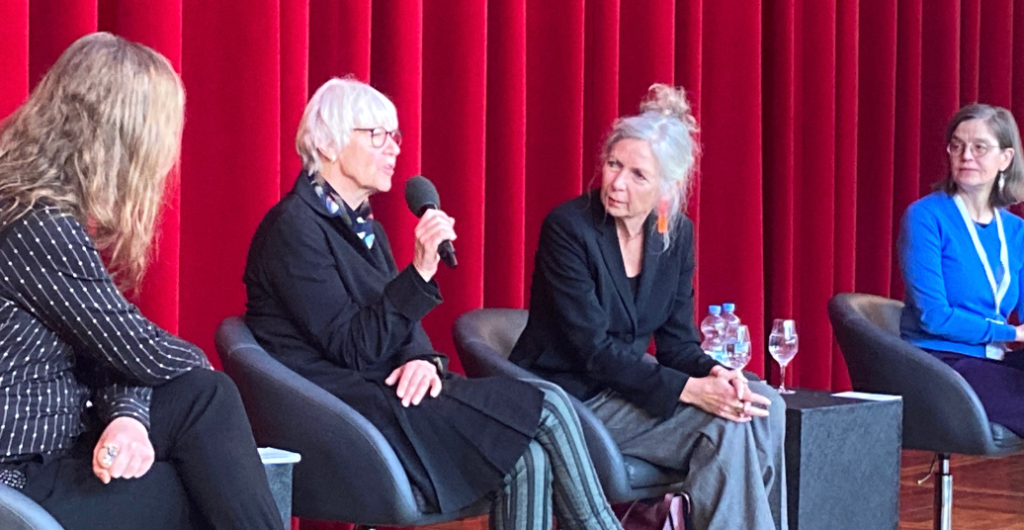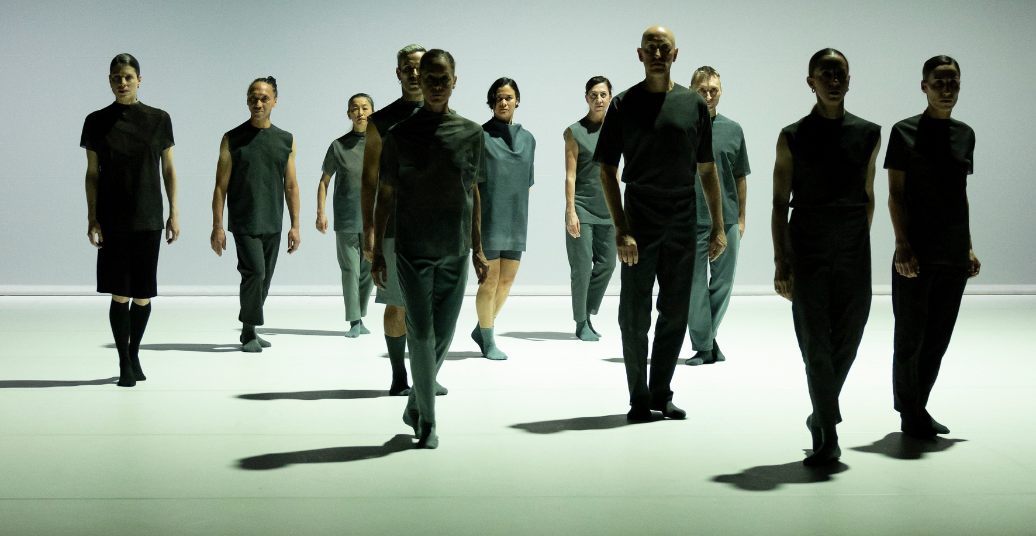Kathleen Heil (dance journalist) and Rachel Oidtmann (author / dancer) write alternately in their native languages English and German about the Tanzplattform Deutschland 2024.
In Mellowing, a work by choreographer Christos Papadopoulos performed by the Dance On Ensemble, a dancer holds a small earpiece as if to cue up the sound, setting the minimalistic movement of ten dancers in motion. It was as if Ligeti’s symphonic poem for one-hundred metronomes and ten performers unfurled in the instruments of the performers themselves, instead of being displaced onto the mechanism of the ticking devices. The dancers began a small shuffling step, side to side, very nearly in place, that broke open into small variations, as though illuminating glitches in the Geist in the machine. Some of the dancers performed the tiny two-step with rigid upper bodies, others allowed their shoulders to follow the flow.
They travelled across the stage to come together in different constellations and then dispersed. Time ticked in and through their bodies, the bodies keeping rhythm in a manner both concordant with each other and discordant in their individual variations in the step, which became part of the choreographic canvas in its constrained vocabulary, at the dance’s end, the movements had a third-act crescendo of sorts, with the steps opening out into swooping arms, the lights and music also intensifying in dramatic force. I would have been curious to see the work stay within the rigor of its constraints, the steps ticking down in diminuendo, but the work was beautiful, as were the dancers in their dance. The sense of time contained in the bodies of the Dance On ensemble, a group consisting of professional dancers age forty and over, had a delicacy and resonance that worked differently than had the piece been performed by a group of recent conservatory graduates.
I’ve been thinking about anxieties over aesthetics the last days, not only while at the Tanzplattform, but in general, in particular as surrounds cultural policy debates in Germany. I wonder if we are doing a disservice to the art form to de-emphasize that a central feature of dance is that it offers an aesthetic experience, and that this has value. Do we worry that aesthetics are frivolous or irrelevant, that art has to be functional, is this why dance journalism is subjected to click counts? In a German-language discussion produced by TANZ.media, Bettina Schulte and Lilo Weber spoke about the state of dance writing in Germany and Switzerland, in a panel moderated by Rico Stehfest and Melanie Suchy. Lilo Weber described the task of writing about dance as one of transformation, rather than translation, and Bettina Schulte pointed out that if the metric of dance writing’s success becomes page hits or click counts that culture does not stand a chance, that we should understand the value of dance and dance writing outside of such metrics.

Das Bild vom Tanz, Rico Stehfest, Lilo Weber, Bettina Schulte, Melanie Suchy (v.l.n.r.) ©Kathleen Heil
Rico Stehfest spoke of his practice of writing about dance as that of a seismograph, and I thought back to the shakes, ticks, and undulations of Mellowing, the after-effects of the work still moving back and forth in my own body. The force and duration of the dance was thanks, of course, to its aesthetic features, the ideas and sociological resonance of those ideas mediated through its formal properties. Can we celebrate dance as an art form, and aesthetic experience, precisely because it puts across rich and complex ideas through its formal mechanisms? This is also why dance writers and journalists are important and necessary independent of page clicks, because they contribute to the conversation by distilling the Stoff of the art of life into words. As the late, great dance critic Edwin Denby wrote: “Art takes what in life is an accidental pleasure and tries to repeat and prolong it.”
Thanks for reading and exchanging these accidental pleasures at the Tanzplattform Deutschland 2024 in Freiburg in these days. May there be more to delight in at the next edition, taking place in 2026, in Dresden.
As part of tanzschreiber@TPD24, a cooperation between Tanzbüro Berlin and the organizers of Tanzplattform Deutschland 2024 (dance department of Theater Freiburg), Rachel Oidtmann (author / dancer) and Kathleen Heil (dance journalist) accompanied the festival in writing. The Tanzplattform Deutschland 2024 took place from February 21-25, 2024 in Freiburg.




